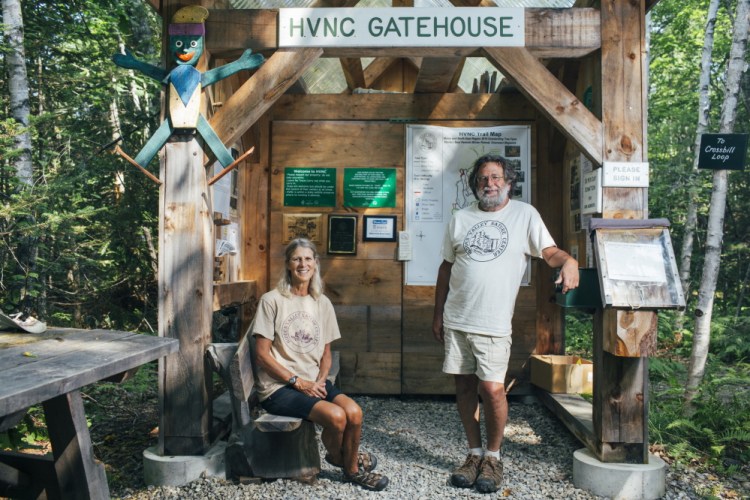JEFFERSON — David “Tracy” Moskovitz and Bambi Jones began buying forestland behind their farm two decades ago. At the time they never thought a 45-acre parcel would expand to become Hidden Valley Nature Center.
Moskovitz is a former commissioner at the Maine Public Utilities Commission and a founding partner of the Regulatory Assistance Project, which helps utilities transition to clean energy. Jones, his wife, is a lawyer who became one of Maine’s first farmers to sell her food through the community-supported-agriculture model. Both love to hike, ski and explore wild places.
In 1993, when they decided to find the pristine pond they saw on maps behind their farm, they recruited the help of a neighbor, Gary Hayward, a Registered Maine Guide. When Hayward led them to Little Dyer Pond, Moskovitz and Jones set out to purchase it.
“We went to all the neighbors and said, ‘If you’re interested in selling, we’re interested in buying,’ ” Moskovitz said. “We thought, here’s a special place. We’ll use a slow, focused effort. Those first three pieces came in the first three to four years.”
Over the next 15 years as parcels came up for sale, Jones and Moskovitz bought them. When they sent holiday cards, they reminded their neighbors of their wish to own the land. And an idea formed.
“As a CSA farmer, Bambi had 120 members who had a personal interest in our land. We liked that they were friends, not just customers,” Moskovitz said. “So we got to thinking, maybe we could build on the CSA experience and have members at a nature center.”
In 2007 Hayward advertised a hike on the land in the local paper with the simple invitation: “Call Gary for information.” The response was overwhelming. So Hayward held more outdoor events. Huts were built for hikers and skiers. And soon Moskovitz and Jones’ project resulted in the nonprofit Hidden Valley Nature Center and an offer to the public to come enjoy the quiet enclave.
Then something unexpected happened. As people discovered the nature center, they offered expertise in timber framing, art, botany and birding. Hidden Valley offered nature courses taught by volunteers, as many as 50 seminars a year, and as Moskovitz likes to say, “a billion other fun things.”
The couple’s wild preserve grew to 733 acres by 2009, the year it became a nonprofit land trust. And by the time the nature center’s holdings swelled to 1,000 acres, unique educational events were offered by volunteers. This fall, Hidden Valley merged with three other land-protection groups to form the Midcoast Conservancy.
Maine Land Trust Network director Warren Whitney said Hidden Valley’s creative approach by staging off-beat events follows a national trend as land trusts struggle to get people to use their lands.
“We did not plan on doing this,” Moskovitz said. “But the Chinese have a saying: ‘You cross the river one step at a time, feeling each stone under your feet.’ That’s pretty much how it’s been. We had ideas but a lot of ideas came from members. Now people come here and enjoy people.”
Copy the Story Link
Send questions/comments to the editors.




Success. Please wait for the page to reload. If the page does not reload within 5 seconds, please refresh the page.
Enter your email and password to access comments.
Hi, to comment on stories you must . This profile is in addition to your subscription and website login.
Already have a commenting profile? .
Invalid username/password.
Please check your email to confirm and complete your registration.
Only subscribers are eligible to post comments. Please subscribe or login first for digital access. Here’s why.
Use the form below to reset your password. When you've submitted your account email, we will send an email with a reset code.